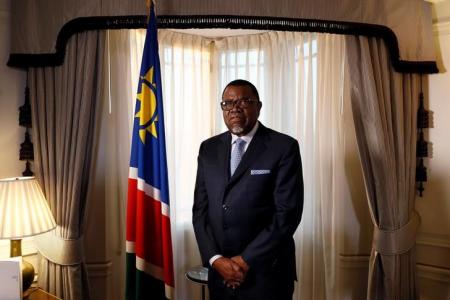
By Claire Milhench
LONDON (Reuters) – Namibia would remain a member of the International Criminal Court (ICC) if the United States joined, Namibia’s president Hage Geingob told Reuters in London on Thursday.
Namibia said in March that it would withdraw from the ICC, which sits in The Hague and has the jurisdiction to prosecute individuals for genocide, crimes against humanity, and war crimes. The court has come under criticism from African nations.
“People are saying that it only targets African leaders. That seems to be true … and that’s a problem,” said Geingob, who was elected as president of Namibia in November 2014.
Whilst parliament still needs to debate Namibia’s withdrawal, Geingob said his feeling was it would go ahead.
“But if you convince the United States to come, we will stay,” he said.
The United States is not currently a participant in the ICC as it has not signed or ratified the Rome Statute, a treaty which serves as the ICC’s governing document.
“Africa needs to develop its own processes, systems, courts and institutions,” Geingob added. “It would help us to be self sufficient. We must build lasting institutions … not something imposed from foreign countries.”
Turning to the economy, Geingob said he expects growth of 2 to 3 percent in Namibia in 2017, up from around 2.5 percent in 2016, and below the average longer term trend of 4-5 percent.
“But we need about 7 percent growth, which we are failing to do,” he said. “That’s why are encouraging people to come in to invest, to manufacture in Namibia, transfer technology, and that way we can create jobs.”
Namibia’s economy has been hit by a prolonged drought and a contraction in the mining sector, but Geingob said tourism had picked up this year with more people choosing Namibia over destinations in the Middle East due to the troubles there.
The Namibian economy is also closely linked to that of South Africa, and Geingob added they were following political developments there. An ongoing feud between President Jacob Zuma and Finance Minister Pravin Gordhan has unnerved investors and business leaders.
“What happens in South Africa has a serious impact on the region and Namibia,” he said. “So we are looking at the situation carefully, and are sometimes worried, but the system is resilient and they will overcome that – they are a democratic country.”
(Editing by Hugh Lawson)











